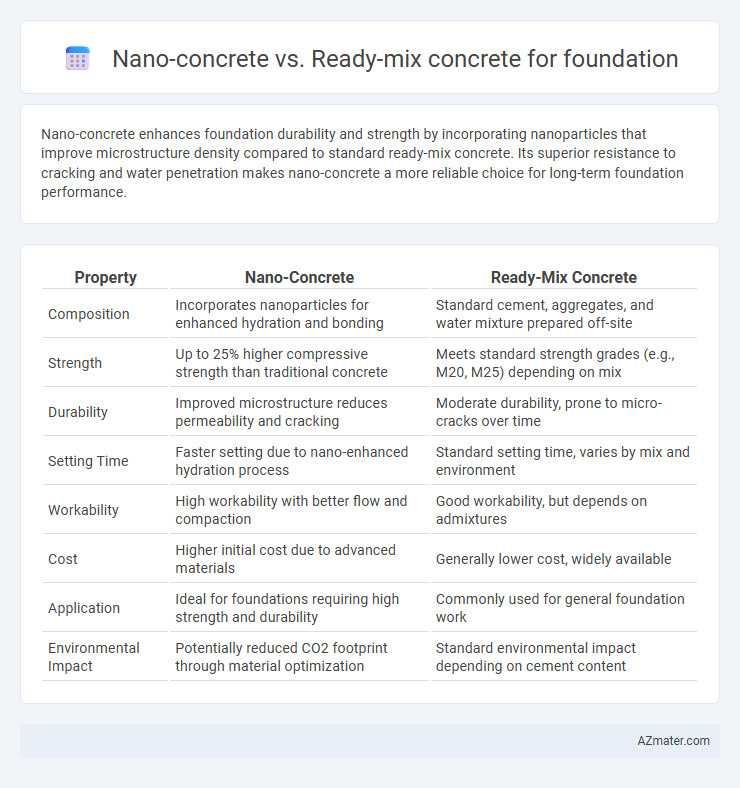Nano-concrete enhances foundation durability and strength by incorporating nanoparticles that improve microstructure density compared to standard ready-mix concrete. Its superior resistance to cracking and water penetration makes nano-concrete a more reliable choice for long-term foundation performance.
Table of Comparison
| Property | Nano-Concrete | Ready-Mix Concrete |
|---|---|---|
| Composition | Incorporates nanoparticles for enhanced hydration and bonding | Standard cement, aggregates, and water mixture prepared off-site |
| Strength | Up to 25% higher compressive strength than traditional concrete | Meets standard strength grades (e.g., M20, M25) depending on mix |
| Durability | Improved microstructure reduces permeability and cracking | Moderate durability, prone to micro-cracks over time |
| Setting Time | Faster setting due to nano-enhanced hydration process | Standard setting time, varies by mix and environment |
| Workability | High workability with better flow and compaction | Good workability, but depends on admixtures |
| Cost | Higher initial cost due to advanced materials | Generally lower cost, widely available |
| Application | Ideal for foundations requiring high strength and durability | Commonly used for general foundation work |
| Environmental Impact | Potentially reduced CO2 footprint through material optimization | Standard environmental impact depending on cement content |
Introduction to Nano-concrete and Ready-mix Concrete
Nano-concrete incorporates nanoparticles to enhance properties like strength, durability, and workability, making it ideal for foundations requiring superior performance. Ready-mix concrete is a pre-mixed, factory-produced blend of cement, aggregates, and water, delivered to construction sites for immediate use, offering consistency and time-saving advantages. Both materials serve foundation applications, but nano-concrete provides advanced microstructural benefits beyond the conventional ready-mix concrete's standard formulation.
Composition and Material Differences
Nano-concrete incorporates nanoparticles such as silica fume, titanium dioxide, and carbon nanotubes into a traditional cement matrix, enhancing strength, durability, and impermeability at the nanoscale level. Ready-mix concrete consists of cement, water, aggregates, and admixtures proportioned and mixed in a batch plant before delivery, aimed at convenience and consistent quality but lacking the nano-engineered additives that improve microscopic bonding. These compositional differences result in nano-concrete exhibiting superior mechanical properties and resistance to environmental degradation compared to standard ready-mix concrete used in foundation construction.
Strength and Durability Comparison
Nano-concrete exhibits superior strength and durability compared to ready-mix concrete due to its enhanced microstructure and reduced porosity, resulting from nanoparticle integration that increases compressive strength by up to 30%. Its nanomaterials improve hydration processes, leading to higher resistance against environmental degradation and chemical attacks, significantly extending foundation lifespan. Ready-mix concrete, while convenient and widely used, generally lacks these nano-scale reinforcements, making it less resilient under high stress conditions and long-term exposure.
Workability and Mixing Techniques
Nano-concrete enhances workability by incorporating nanoparticles that improve particle packing and reduce voids, enabling smoother flow and easier placement compared to traditional ready-mix concrete. Mixing techniques for nano-concrete require precise dispersion of nanoparticles using advanced methods such as ultrasonic mixing or high-shear mixers to ensure uniformity and optimal strength. Ready-mix concrete relies on conventional batching and mixing processes, which are faster but may lack the microstructural refinement provided by nano-additives in foundation applications.
Setting Time and Curing Requirements
Nano-concrete features accelerated setting times due to its enhanced nano-materials that improve hydration kinetics, allowing foundations to achieve early strength faster than traditional ready-mix concrete. Ready-mix concrete typically requires longer curing periods, often 7 to 28 days, to reach optimal strength and durability, whereas nano-concrete benefits from reduced curing durations, leading to quicker construction timelines. The improved curing efficiency of nano-concrete minimizes moisture retention needs and enhances microstructure, making it ideal for foundations demanding rapid load-bearing capacity.
Environmental Impact and Sustainability
Nano-concrete significantly reduces environmental impact by utilizing nanoparticles that enhance strength and durability, leading to decreased material consumption and extended structural lifespan compared to traditional ready-mix concrete. Ready-mix concrete often results in higher carbon emissions due to substantial cement usage and transportation logistics, whereas nano-concrete's improved efficiency lowers CO2 footprint per cubic meter. Sustainable construction benefits from nano-concrete's ability to reduce resource waste and incorporate eco-friendly additives, promoting greener foundations and minimizing long-term environmental degradation.
Cost Analysis and Economic Feasibility
Nano-concrete typically involves higher initial material costs due to advanced nanoparticles enhancing strength and durability, resulting in lower long-term maintenance expenses compared to ready-mix concrete. Ready-mix concrete offers immediate cost savings with widespread availability and established production, yet may incur increased lifecycle costs under severe environmental conditions. Economic feasibility favors nano-concrete in critical foundation projects demanding enhanced performance and longevity, while ready-mix concrete remains cost-effective for standard constructions with less stringent durability requirements.
Performance in Foundation Applications
Nano-concrete enhances foundation performance through its superior strength, reduced porosity, and accelerated curing time compared to ready-mix concrete, leading to increased durability and resistance to environmental stressors. Ready-mix concrete offers consistent quality and ease of application but may lack the nano-engineered particle distribution that improves microstructure and load-bearing capacity in foundations. For critical foundation applications, nano-concrete provides better resistance to cracking, shrinkage, and chemical attack, ensuring long-term structural integrity.
Challenges and Limitations
Nano-concrete faces challenges such as high production costs, limited large-scale availability, and the need for specialized equipment and expertise during application. Ready-mix concrete, while widely accessible and cost-effective, suffers from limitations like reduced workability over time due to transportation delays and susceptibility to segregation and inconsistency at the site. Both materials present constraints in terms of curing control and quality assurance for foundation applications, impacting structural performance and durability.
Future Trends in Concrete Technology for Foundations
Nano-concrete incorporates nanoparticles like nano-silica to enhance strength, durability, and crack resistance, positioning it as a superior choice for future foundation construction compared to traditional ready-mix concrete. Advancements in nanotechnology enable precisely engineered microstructures that improve load-bearing capacity and reduce permeability, addressing common foundation issues such as water ingress and structural fatigue. Ongoing research predicts widespread adoption of nano-concrete due to its sustainability benefits, including reduced cement consumption and longer service life, driving the evolution of foundation engineering.

Infographic: Nano-concrete vs Ready-mix concrete for Foundation
 azmater.com
azmater.com